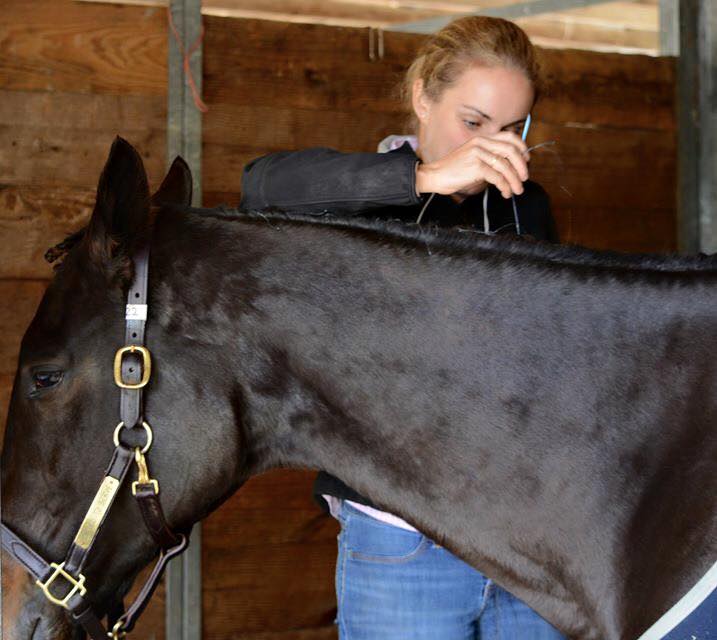“How much will it cost if you do the whole thing?”
“About $150. I’m just doing this to pay my way through grad school.”
“Uh-huh. Sure. We’ll see you back here next weekend.”
This is the conversation I find myself having most weekends during the winter. I show up for a job. The weathered old men eye me up and down as I saunter down the shed row; the catcalls from the young grooms, and the dirty looks from the women.
I enter the establishment layered from head to toe but quickly shed layers as I do my job. First the jacket and then the fleece. My arms begin to ache and my lower back burns from constantly bending in ways I should never bend.
As I sway to the music pulsating in my ears, acknowledging that I hate every minute of this ridiculous dance, I remind myself that if I just finish this one, I can pay for that event. If I do 3 or 4 more, I can pay for that clinic. And, if I keep coming back weekend after weekend, I might just get that saddle I have been eyeing.
Yet, with each arrangement made and each wad of cash received, I acknowledge that I hate every moment of it. This is no way to live—constantly hating what you do. But that is the life of a clipper.
I am broke. A graduate student’s salary doesn’t exactly support an equestrian lifestyle. I live on ramen so my horses can eat alfalfa. I wear hand me downs so that my horses can get new blankets. I cut my own hair so that I don’t have to cut my budget. But I’m scrappy. I clip, braid, pull and trim my own so I can pay for that one show or that weekend clinic.

Yeah, I braid too…
Slowly, somehow, people began to notice…the clean lines and the even spacing…the well turned out horse standing next to a gaunt girl who looked like she would do just about anything for a bottle of beer instead of a can. Business picked up. Before I knew it I had fallen into the rabbit hole and began to pursue a life of clipping.
Most patrons assume we do this because we like it, like that’s even possible. Our customers try to strike us as we dance around them, just trying to finish the job. We come home sore and covered in slobber and hair, our lower backs screaming in pain, our knees constantly aching.
It is a vile, disgusting, unappreciated way to make a living.
I show up and I’m immediately told the handsome studs named “Bobby” and “Ed” will be gentle, and anyone could get the job done on those two. I am forewarned that, “Freddie” occasionally bites, but it’s just playful, he’s not actually mean. And I’m told to not even attempt to get the job done on the asshole named “Luke” unless he has someone else there to restrain him.
I do my job with a forced smile and tense shoulders, fully acknowledging the misery. But I envision that ribbon or flashing crystals of the new rhinestone encrusted browband, or even the beautiful round edges of the number 0 my vet’s balance sheet, and off I go to clip.

When I’m done I get the hell out of there. My body actually quivers as I get into my truck, wanting nothing more than to get into a shower and wipe the filth off of me. Clipping is no way to live. But it’s fine, for now. Even though it’s a thankless, tedious job, it’s also a means to an end; a job that pays the bills and puts food in the stall.
So the next time you make that call to hire that hidden warrior, be nice. You might have all of the power and all of the money, but they have the skill, and more importantly, the need. While you watch them sway to the music in their head, whispering sweet nothings into their subject’s ears, think to yourself: have I thanked my clipper lately?
If the answer is no, dig deep into your pockets and show your appreciation, because we clippers need it, and deserve it. We might be clippers, but we’re people too.
About the Author
Carleigh Fedorka is a Ph.D. student at the University of Kentucky’s Gluck Equine Research Center. A Pennsylvania native, she moved to Kentucky after graduating from St. Lawrence University and has worked closely in all aspects of the thoroughbred industry. She spends her free time eventing as well as training, selling and rehoming OTTBs. Read more about her horse life at her blog, A Yankee in Paris.




 February 22, 2017
February 22, 2017 






















